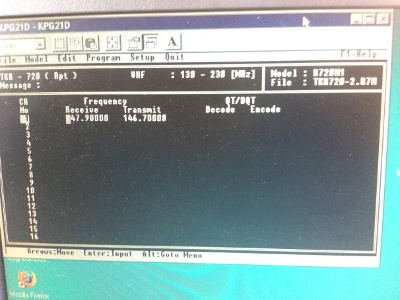DEPLOYING THE KENWOOD TKR-720
50 WATT VHF REPEATER
by: Ramon Gandia, AL7X
50 WATT VHF REPEATER
by: Ramon Gandia, AL7X
Opened up on Ramon's Workbench

Here we see the Kenwood TKR-720 repeater, opened up for programming and adjustments. These repeaters are synthsized, and come in VHF and UHF models.
The synthesizer is a free running oscillator, actually on the channel frequency (in this case 146.7 mhz. This would be very unstable under normal circumstances. The oscillator is tuned to frequency by a varactor diode.
In this picture we see the TKR-720, and in front of it, the KPT-50 programmer that can be used "stand alone" with its keypad, or connected to the serial port of a laptop, which is the way I have it hooked up.
The left compartment is the 12v linear power supply; the right compartment has the receiver and both VCO's, as well as the signaling board and control towards the fromt under the golden cover. The TX exciter/driver and Power amplifier towards the rear. the rear.
Programming it

The free running oscillator output is sampled in a divide-by-N circuit and compared to a precision Temperature Compensated Crystal Oscillator (TCXO) operating at 12.5 mHz.
The frequency difference is the "error", which is compensated by the circuit tuning a varactor diode in the oscillator until the frequency is right on.
The "Divide-by-N" is programmable, and by digital magic is calibrated to the actual desired frequency. In this picture we see the software that programs it; you can see the desired TX and RX frequencies as I typed them in.
No purchase ($75 each) of crystals for the receiver, and transmitter needed, nor the need to wait for the crystals (30 days). Just enter the numbers, and ways to go!
This is the KPG-21D programming software running in a DOS Window under Windows 98SE. The laptop has a serial port to connect to the KPT-50 programmer.
The finished product

This is the finished product, puts out a really smooth signal, adjustable in frequency anywhere in the ham 144-148 band, with power variable from 5 to 50 watts.
Kenwood also is noted for hi-fi stereo equipment, and all of their repeaters have outstanding audio.
There is also a UHF model that can hold a built-in duplexer and covers 440-450 mHz.
Article and Pictures
Copyright © 2012, Ramon Gandia